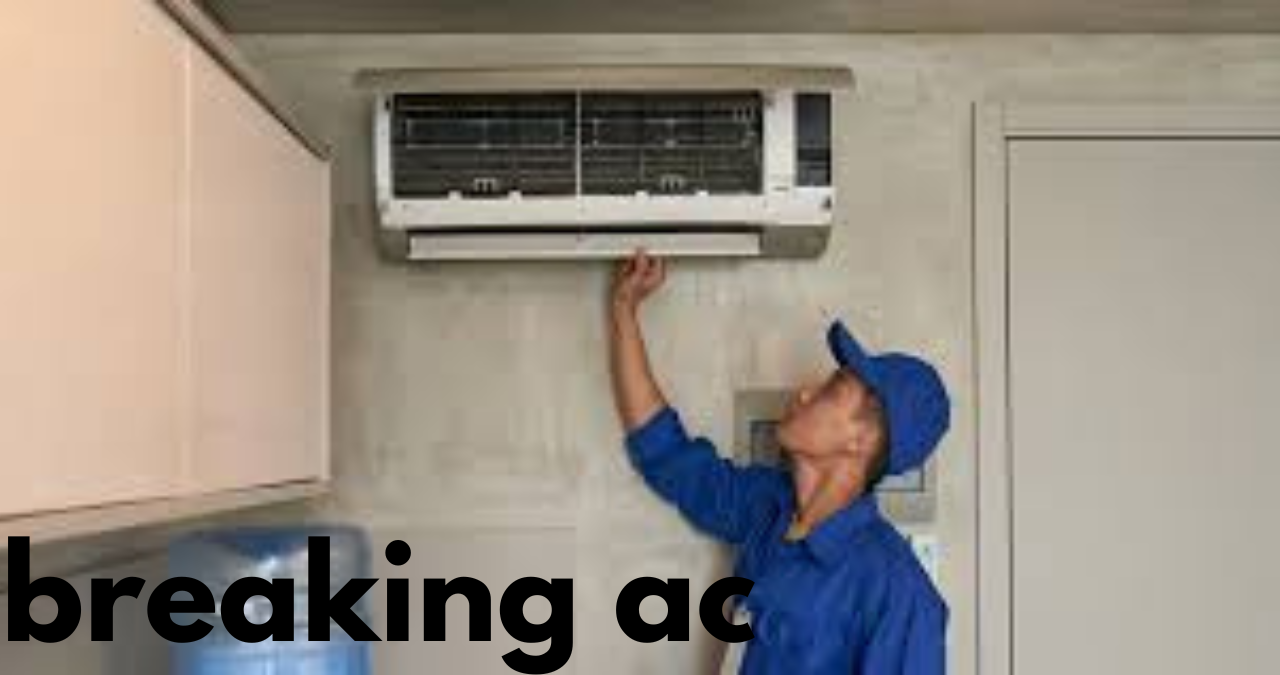Air conditioners (ACs) are a vital part of modern breaking ac living, offering comfort and relief during hot weather. Whether in your home or office, a well-functioning air conditioning unit helps regulate temperatures, purify air, and create a conducive environment for work and relaxation. However, when your AC breaks down, it can disrupt daily life, leaving you with the uncomfortable heat to contend with. Understanding why breaking ac down, how to identify the signs, and knowing how to prevent such breakdowns can save you time, money, and frustration.
This article will delve into the common causes of air conditioning failures, the warning signs to look out for, DIY troubleshooting tips, and preventive measures to ensure your AC runs smoothly for years to come.
1. Common Causes of Air Conditioning Breakdowns
1.1 Electrical Issues
Electrical problems are among the leading causes of AC breakdowns. Faulty wiring or electrical connections can prevent your unit from receiving the power it needs to operate. When circuits are damaged or power surges occur, the AC’s internal components, such as the compressor or motor, may malfunction. Tripped circuit breakers are also a common issue. If the circuit breaker keeps tripping, it is often a sign that your AC is drawing too much power, which can lead to overheating and eventual failure.
Another possible electrical issue is a blown fuse. If the fuse is not functioning, it will stop the unit from starting up. Power surges caused by storms or fluctuating electricity can also damage sensitive components inside your AC unit. In these cases, an electrician should inspect the unit and its wiring to ensure everything is in good working condition.
1.2 Mechanical Failures

Mechanical failure, particularly with the compressor or the blower motor, can be a significant reason for air conditioning breakdowns. The compressor is responsible for circulating refrigerant throughout the system to regulate temperatures. If the compressor is damaged, the cooling process cannot be completed, leading to warm air blowing from your unit.
Similarly, the blower motor plays a critical role in circulating cool air through your home. If the blower malfunctions, it may lead to reduced airflow, causing your AC to work harder without producing desired results. Routine maintenance, including lubrication and cleaning, can help prevent these mechanical issues, but once the components are damaged, they may require professional repair or replacement.
1.3 Lack of Maintenance
Proper maintenance is essential for the longevity of any AC unit. Without regular servicing, an air conditioner can accumulate dirt, dust, and debris, especially around the filters and coils. Clogged filters are one of the most common causes of reduced efficiency and performance. Dirty filters restrict airflow, causing the system to overheat and eventually break down.
The evaporator and condenser coils also need to be cleaned regularly. If these coils become dirty or frozen, your AC unit will struggle to cool the air effectively. Additionally, low refrigerant levels can also lead to performance issues. It’s crucial to check refrigerant levels and top them off when necessary, as an undercharged unit can cause serious long-term damage.
1.4 Environmental Factors
The environment around your AC can also contribute to its breaking ac. Outdoor units, in particular, can suffer from the accumulation of debris such as leaves, twigs, or dirt, which obstructs airflow and reduces cooling efficiency. In extreme weather conditions, such as heavy rains or high winds, the external unit can be exposed to additional wear and tear, leading to malfunctions.
Furthermore, if the AC is installed in an area that is poorly ventilated or receives direct sunlight for extended periods, it can cause the system to overheat, which affects its ability to cool properly. Regularly checking for and clearing any debris from the external unit, as well as ensuring proper placement of the AC, can help prevent environmental factors from causing breakdowns.
2. Signs Your AC Might Be Breaking Down
2.1 Unusual Noises
A properly functioning air conditioner should run quietly in the background, but when mechanical issues arise, you may hear strange noises. A clicking, buzzing, or grinding sound typically indicates a malfunction in the compressor or the fan motor. This could be due to worn-out bearings or loose components, which may require professional repair. If you hear a hissing noise, it could point to a refrigerant leak, which needs to be addressed promptly to avoid further damage.
Ignoring unusual noises could lead to more severe damage over time. Therefore, if you notice strange sounds coming from your unit, it is crucial to have it checked by a professional as soon as possible.
2.2 Inconsistent Cooling or Hot Air
If your air conditioner is not cooling effectively, or if hot air is blowing out instead of cold air, this is a significant sign that something is wrong. One common cause for this issue is a refrigerant leak, where the system runs low on refrigerant and can no longer effectively cool the air. Another cause could be a broken compressor, which is responsible for moving refrigerant throughout the system. In either case, it is essential to have a technician diagnose and fix the problem to restore proper cooling.
Inconsistent cooling can also be a result of a malfunctioning thermostat, which fails to regulate the temperature correctly. If your thermostat is not reading temperatures accurately, it may trigger the unit to either overheat or underperform, causing uneven temperature distribution.
2.3 Water Leaks or Excess Moisture
Water leaks near your air conditioning unit or the presence of excess moisture in the surrounding area are warning signs of trouble. Most ACs have a drainage system that removes condensation, but when the drainage system becomes clogged or broken, water can pool around the unit. This can cause water damage to the surrounding walls, floors, and even lead to mold growth if left untreated.
Another possible cause of water leaks is a dirty evaporator coil. When the coil becomes frozen due to a refrigerant leak, it can lead to excessive condensation that overflows the drainage system. Addressing water leaks quickly is essential to prevent further damage to your unit and home.
2.4 Foul Odors
If your AC emits foul odors, it could be a sign of mold or mildew growth inside the unit or the ducts. Musty smells often indicate trapped moisture or a clogged filter, which creates a breeding ground for bacteria. On the other hand, a burning smell can be a sign of overheating components or electrical failure. In either case, it’s essential to have your system inspected and cleaned immediately.
Regularly cleaning your filters and ducts, as well as scheduling professional servicing, can help prevent unpleasant odors and maintain indoor air quality.
3. How to Fix a Broken AC: Troubleshooting and Solutions
3.1 Quick DIY Fixes
While some AC issues require professional intervention, there are a few simple fixes you can try before calling a technician. Start by checking and replacing the air filter. A clogged filter restricts airflow and can lead to overheating, reducing your system’s efficiency. Additionally, cleaning the condenser coils and ensuring the outdoor unit is free from debris can improve performance.
Another quick fix is resetting the thermostat or checking the batteries if it’s a digital unit. Sometimes, thermostat settings get accidentally changed, leading to improper cooling. Make sure the thermostat is set to the cooling mode and that the temperature is appropriately set.
3.2 When to Call a Professional
While DIY fixes can resolve minor issues, more complex problems require professional help. If your AC is leaking refrigerant, making strange noises, or if you notice significant cooling issues, it’s best to call a technician. Refrigerant issues, for example, require the expertise of an HVAC professional to recharge the system and locate any leaks.
Electrical issues, such as circuit breaker trips or faulty wiring, should never be handled by unlicensed individuals. Calling an electrician ensures that the job is done safely and correctly.
3.3 Temporary Solutions for Emergency Situations
If your AC breaks down unexpectedly and you need a temporary solution, try using fans to circulate air in the room. Close curtains and blinds to block out sunlight and reduce the temperature. You can also place a bowl of ice in front of the fan to create a cooling effect.
If the breakdown occurs during extreme heat, consider using a portable air conditioning unit or window fan until your primary AC is repaired.
4. Preventing Air Conditioning Breakdowns
4.1 Regular Maintenance and Servicing
The best way to avoid AC breakdowns is through regular maintenance. Having your AC serviced at least once a year ensures that any potential issues are caught early. During a service appointment, a technician will check refrigerant levels, clean coils, and inspect all components for signs of wear.
You can also perform some basic maintenance tasks yourself, such as cleaning or replacing filters every 1-3 months and clearing debris from the outdoor unit. Proper maintenance helps keep your AC running efficiently and extends its lifespan.
4.2 Installation Best Practices
When installing a new AC unit, it’s essential to hire a qualified professional to ensure the unit is correctly set up. Proper installation ensures the unit operates efficiently and reduces the risk of breakdowns. Choosing a high-quality, energy-efficient unit also contributes to better performance and fewer repairs.
4.3 Smart Usage and Care
Smart usage practices can also help prevent unnecessary strain on your AC. Set your thermostat to an energy-efficient temperature (around 78°F in summer) and avoid drastically changing the temperature. Limit the use of heat-producing appliances during peak cooling hours, and ensure that your home is properly insulated to reduce the load on your AC.
Conclusion
Understanding the causes of air conditioning breakdowns, recognizing the signs, and implementing preventive measures can go a long way in ensuring the longevity of your AC system. Regular maintenance, proper installation, and timely repairs are key to keeping your air conditioner functioning smoothly, especially during the hottest months of the year.
FAQs
- How often should I service my air conditioner?
- It’s recommended to have your AC serviced at least once a year, ideally before the summer season begins.
- What are the signs that my AC is low on refrigerant?
- Inconsistent cooling, hissing sounds, and a lack of cold air are common signs of low refrigerant.
- Can I fix an AC breakdown on my own?
- Simple fixes like changing filters and cleaning debris can be done yourself, but complex issues should be handled by a professional.
- What should I do if my AC is blowing warm air?
- Check the thermostat settings, change the air filter, and inspect for refrigerant leaks or mechanical failures.
- How long do air conditioning units typically last?
- With proper maintenance, most air conditioning units last between 10-15 years.
- Why is my AC leaking water?
- Clogged drains, dirty coils, or frozen evaporator coils can lead to water leakage from your AC unit.
- How can I avoid costly AC repairs?
- Regular maintenance, timely repairs, and proper usage can help prevent costly breakdowns.
- Is it worth repairing an old air conditioning unit or should I replace it?
- If your AC is over 10 years old and frequently breaking down, it may be more cost-effective to replace it with a new, energy-efficient unit.
- How can I improve my air conditioner’s efficiency?
- Regular cleaning, proper insulation, and smart thermostat settings can improve efficiency and reduce energy bills.
- What causes bad smells from an AC unit?
- Musty odors are often due to mold or mildew buildup, while burning smells may indicate electrical problems.
You May Also Read:https://daliyuknews.com/programming-insider/




